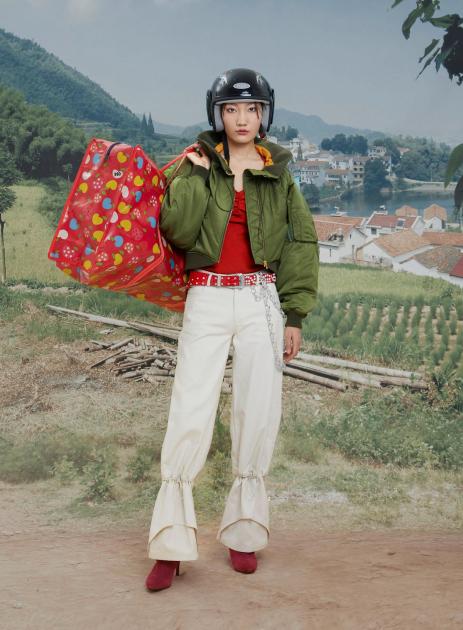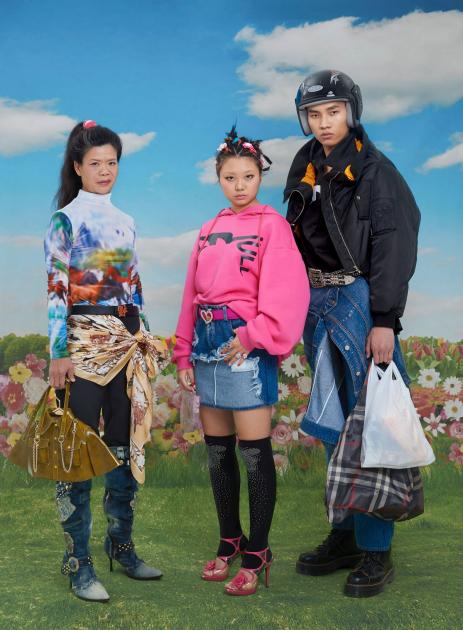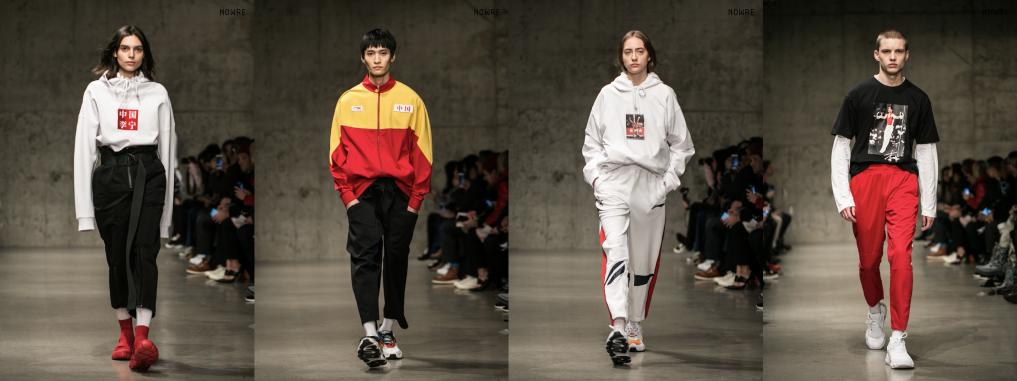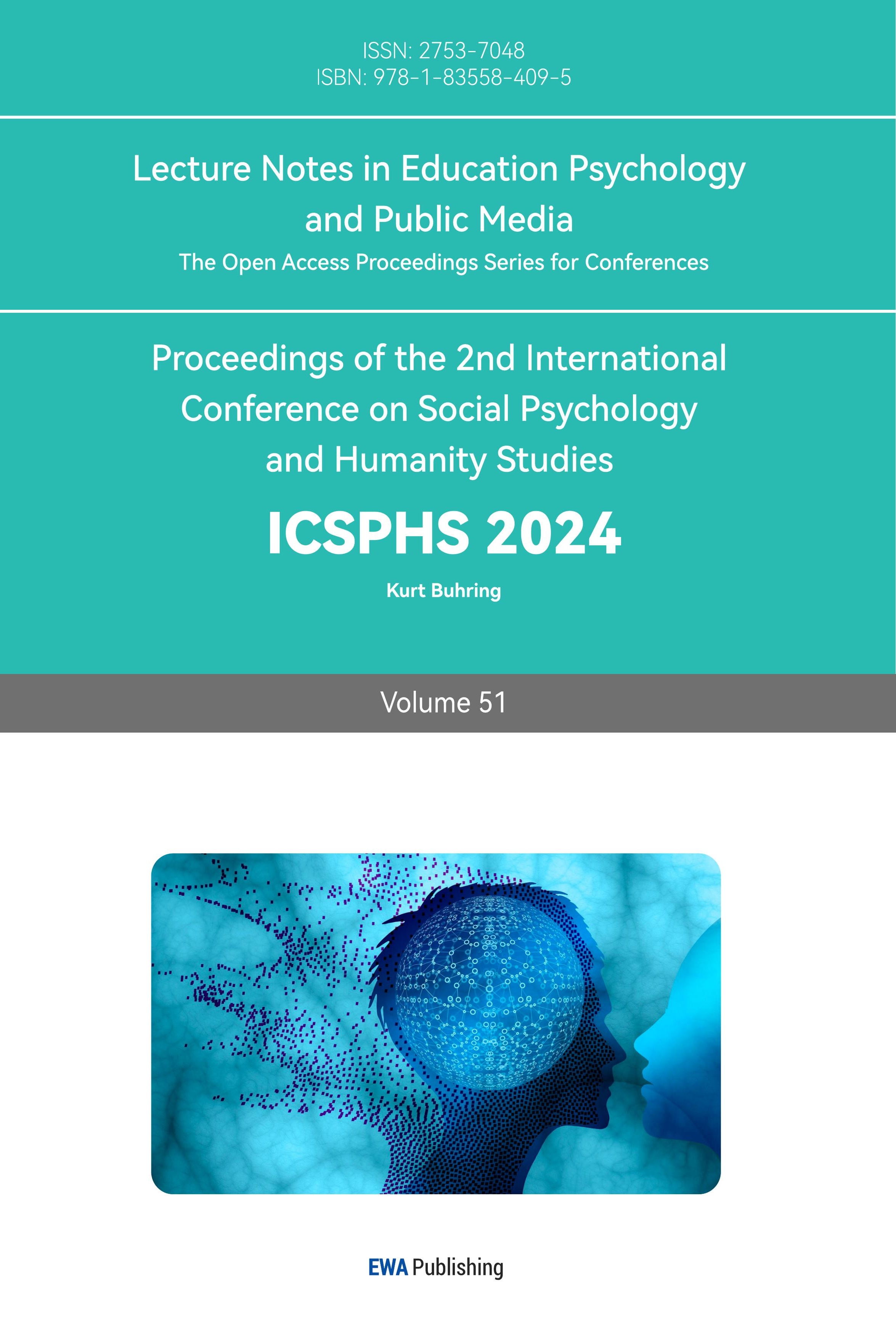1.Introduction
In 2016, when the video blogger "Yang ya(养鸭, raise duck, real name Li Zhiyuan) posted a music video on Weibo titled "Too Cool To Be True", he may not have thought that this video would start to become popular on the internet, along with his creation of a fashion style called "Tuku means a old-fashioned style with strongly Chinese rural vibe. For a while, clothing styles and elements with the keyword Tuku began to frequently appear on major social media and online stores. Tuku, as its name implies, is a kind of "cool" with "unfashionable". It contrasts the inner spirit of coolness with the external image of "Tu(土, outdated)", and is an aesthetic taste based on local cultural confidence.
2.Overview of Tuku
2.1.The Origin of Tuku
Tuku refers to a down-to-earth aesthetic taste that looks very tacky, but gives people an inexplicable fashion sense. Essentially, Tuku is a retro style with a strong Chinese rural atmosphere. "The meaning of ‘Tuku’ is ‘too cool’, it does not emphasize ‘Tu’, but rather ‘too (very) ’, which is the highest level of cool." Li Zhiyuan, The founder of Tuku has put forward the above views on the internet.[1] Small town youth are the most responsive group in China's urbanization process, with a focus on new urban planning and adapting to new identities. Appearance transformation is an important step. They actively imitate city dwellers through their attire and appearance, in order to gain recognition and respect and align with mainstream culture. But they are not satisfied with the monotonous fashion in big cities, and are beginning to seek a dressing paradigm that can better showcase their identity and attitude. In China, the most typical example of this phenomenon is the "Feizhuliu(非主流, non-mainstream)" and "Shamate(杀马特, smart)" style that emerged around 2005.[2] The composition of these two styles are mainly composed of small town youth who work in big city. They are far less educated than young people from big cities and grew up in an environment that relatively backward, and their appearance is often considered not exquisite and outstanding enough. Due to this sense of inferiority and in order to integrate into the city more quickly and be valued, they will deliberately imitate the attire of city dwellers and at the same time, put on strong makeup and tall, flashy, and brightly colored hairstyles to attract attention. Feizhuliu and Shamate are manifestations of physical consciousness, as well as a means to compensate for their innate shortcomings and attract attention. But mainstream aesthetics strongly dislike and even reject and despise the bizarre and quirky dressing styles of Feizhuliu and Shamate. Under the siege of mainstream culture, Feizhuliu and Shamate still showed a more rebellious attitude than before. The reason for the emergence of Tuku style is similar to that of Feizhuliu and Shamate. They tried to cater to and identify with mainstream culture, while also showing resistance to the mainstream. But ultimately, the root cause of this is still the unequal relationship between young people in small towns and those in big cities caused by differences in social structure.
2.2.The Connotation of Tuku Style
The expression of Tuku clothing style often appears in a surprising but familiar posture. Surprisingly, in the fashion world dominated by mainstream aesthetics, this deliberate rustic atmosphere is undoubtedly a bold rebellion against mainstream aesthetics. As a fashion style, Tuku emphasizes a diverse attitude through a combination of "Tu" and "cool" based on self identity confidence. This is a recognition of one's cultural background. At the same time, it is also a questioning of mainstream aesthetics. Contemporary youth should not be swayed by a single aesthetic dominated by mainstream culture. In the eyes of Tuku youth, accepting their own background and daring to interpret my identity in a self mocking and self entertaining way is the core of Tuku.[3]
3.The Characteristics of Tuku style
3.1.Retro Tuku
The core of the Tuku style is to showcase the spirit inside with the external out-of-date vibe. In the common Tuku attire, the essential element to make this Tu easy to read symbol is retro clothing. At the same time, retro clothing elements are also the most important part of rustic clothing in the Tuku fashion. Almost all "tacky" clothing styles revolve around the keywords retro, nostalgic, and outdated. For example, oversized suits that look like you've secretly rummaged through your father's wardrobe, low waisted denim jeans adorned with sequins and sparkling diamonds, or bulky and comical dad shoes and thick soled sponge shoes. Tuku may not necessarily equate to "retro", but to present Tuku, it is necessary to be "retro".
It is not difficult to find that retro, as the main element of Tuku style, runs through the entire clothing product line in the brand Toocoolll founded by Li Zhiyuan, the founder of Tuku. Models wear Cuban shirts, and modern photograph style distinguish them from true retro. This aesthetic taste caused by differences is also applied to the products of Chinese fashion brand UOOYAA. In UOOYAA's 2020 Spring/Summer ready to wear collection, UOOYAA combined the themes of Chinese women's volleyball and table tennis with the competition uniforms of Chinese athletes in the 1980s, designing a Tuku style sports set that is full of a sense of time but also modern.
Although the elements used in the practice of the Tuku style can correspond to the popular items of a certain era in the past, the public can still intuitively see their "new" and "cool" from the external "retro" and "rustic" when receiving this clothing style. One is reflected in the material, silhouette, design where "outdated" and "trendy" must be balanced in combination; The second is reflected in the attitude conveyed by the presentation of the overall design: deliberately exploring and practicing old fashion. The Tuku clothing style strives to distance itself from the true retro while embezzling retro elements, it extracts valuable symbols from the past and uses contemporary aesthetic to design.
Figure 1: Toocoolll.[4] Figure 2: UOOYAA.[5]
3.2.Rebellious Tuku
The rebellion of Tuku style stems from the intentional attitude towards Tu in Tuku. Tuku style not only incorporates retro clothing elements, but also adds a more playful and humorous aspect, which is specifically reflected in the exaggeration and emphasis on a outdated symbol in the Tuku style. The ultimate goal of Tuku's rebellion is to embellish and exaggerate past popular symbols to achieve Tuku.
In 2020, on the eve of the Chinese traditional festival Qixi Festival, Balenciaga launched a poster of the Qixi series, but it caused controversy because it was too corny. Two models pose with bags in front of a rural poster. All of a sudden, the Tuku style also became a topic of discussion along with this poster of the strong style of low-cost Chinese studio, and the outdated elements that can be seen everywhere in our daily life were used without decoration. Although the combination of Tuku and luxury brands is really unexpected, but in the "not fashionable" packaging, Balenciaga through the Tuku style achieved more than expected publicity effect, although the industry reviews are mixed, but this Tuku style poster is undoubtedly a heavy blow to the mainstream aesthetic. The derogation of this by the mainstream media is a necessary process of the rebellious journey of the Tuku. Balenciaga pioneered Tuku's style, suggesting that perhaps the fashion industry has long since tired of the excessive pursuit of image perfection in mainstream aesthetics.

Figure 3: Balenciaga 2020 Qixi poster.[6]
3.3.Localized Tuku
Through the analysis of Tuku's style, it is not difficult to find that there is always an emphasis on a key word: background. Background refers to an individual's previous experiences or identity based on family background. It also includes the cultural influences and customs that an individual will soon experience or have already received based on this identity, and this identity must carry collective memory. From a micro perspective, one's background represents the identity bestowed upon them by personal experiences; From a micro perspective, origin represents your ethnicity, the city, township, village, or ethnic group you were born into. From a macro perspective, they all point to the ultimate belonging and a gene that cannot be altered in the blood, it accompanies and affects a lifetime. It is closely related to the background of the practitioners, and it is individual, as well as belonging to society and the collective.Therefore, Tuku must be a localized and down-to-earth. Themed "Home coming", Chinese fashion brand marknull's Fall/Winter 2020 collection presents the Spring Festival homecoming plot familiar to all Chinese in Tuku style. In this series of looks, the model wears a motorcycle helmet and carries a woven bag, standing in front of a screen with a picture of the Chinese countryside, like a migrant worker riding home on a motorcycle to celebrate the Chinese Spring Festival. The collection references clothing and apparel popular among rural youth in the 1990s and early 2000s, such as wide-sleeved bomber jackets, belts and socks decorated with bright diamonds, transparent high heels in fluorescent colors, and even common posters of rural families printed directly on tight T-shirts as patterns. These elements are outdated and outdated in the mainstream aesthetic, but these outdated elements precisely constitute an important part of the homecoming scene. The product of the combination of local culture and foreign culture has also become a concrete symbol representing the cultural spirit, growth experience and values of a person or a nation.


Figure 4: Marrknull “Home Coming” collection.[7]
4.Case Analysis of Tuku Style
4.1.Gosha Rubchinskiy
Gosha Rubchinskiy was founded by designer Gosha Rubchinskiy in 2008 and is a men's fashion brand located in Moscow, Russia. Having experienced the turbulent period of the disintegration of the Soviet Union, his works were largely influenced by the culture of his homeland, especially the culture of the working class youth. Rubinsky once admitted that the works he presented were actually the young people he often saw on the streets and alleys before and after the disintegration of the Soviet Union in his memory. Most of the clothing he designed was inspired by sportswear styles, featuring rough cut clothing and unique color palettes, while also featuring the colors of Russian script and flag (i.e. white, blue, and red).
At Gosha Rubchinskiy's runway, male models with buzz cut dressed in neat shirts and straight pants, old-fashioned sports vests and shorts, all with their tops tucked into their pants. "This is the typical attire of a Russian youth," Gosha Rubins said in an interview with Vogue magazine. In Gosha Rubchinskiy's works, we can always intuitively feel a Soviet style coldness and solemnity, which is generated by the two-way interaction between clothing and people, and becomes even stronger with the blessing of a sense of time. Designer Gosha Rubchinskiy incorporate familiar elements (newsboy hats, 80s style sportswear sets, and the old-fashioned way of tucking tops into pants) into his designs. Simple shapes, simple patterns, and bright but not flashy colors form the main image of Gosha Rubchinskiy's design. Gosha Rubchinsky recreated the appearance of young people who had grown up under the institutionalization of the Soviet era in a thought-provoking way, while the outdated fashion based on clothing form replaced language to reveal a wider range of connotation and more modern design methods. This is a style that combines inclusivity and cunning and also where Gosha Rubchinskiy's cool lies.

Figure 5: Gosha Rubchinskiy.[8]
4.2.Li Ning
In recent years, "China-Chic(国潮)" has become a trend of the new generation with the rise of street youth cultures, such as rap culture and hip-hop culture. "China-Chic" means the combination of "Guo(国, China)" and "Chao(潮, Fashion)". "Guo" represents both China and traditional Chinese culture, while "Chao" represents a fashion trend in clothing and consumption. The characteristic of China-Chic is that it should not only retain and carry forward the Chinese characteristics, but also conform to the aesthetic that conforms to the characteristics of the times. And on the basis of local cultural confidence, we will organically combine Chinese with global, learn from each other's strengths. In 2018, Chinese sportswear brand Li Ning made its debut at New York Fashion Week and released Li Ning's "Wudao(悟道)" series,which sparked heated discussions among Chinese people. Subsequently, Li Ning walked onto the runway of Paris Fashion Week. The old-fashioned Li Ning in the impression of Chinese in the past has become a brand new Li Ning, which is full of cool but does not lose the national brand background.
Li Ning's appearance in China made the term China-Chic known to the public. In essence, China-Chic and Tuku have an inseparable relationship: they are also based on the local culture and self-identification of the identity and confidence, and the style of China-Chic clothing and Tuku can not be separated from the use of retro elements, Tuku is also an important way to create China-Chic. It can be seen that Li Ning's return is actually a phenomenon of revival, with a strong retro style. In the 2018 New York Fashion Week runway, Li Ning uses symbols such as"中国(China)", "李宁(Li Ning)", "体操王子(Gymnastics Prince)" as the carrier of Chinese characteristics and brand heritage, and takes text and images as the most direct visual presentation in clothing design, which is the common design technique of Chinese cultural shirts. At the same time, Li Ning turned his experience as a former gymnast into a symbol[8], incorporating the style and shape of the uniforms of the Chinese gymnastics team and the classic red and yellow color scheme of the Chinese national team into street-style clothing. Through the excavation of local culture, Li Ning transformed abstract emotions and collective memories into concrete text patterns, and combined them with the style of street sports to achieve the integration and unity of "outdated" expression techniques and "cool" clothing forms.

Figure 6: Li Ning 2018 men’s wear.[9]
4.3.Hu die gong zhu(Princess Butterfly)
From rural area to cities, in the process of urbanization, Chinese town youth who have extensive access to the Internet due to the high popularity of mobile terminal devices are the most sensitive group to fashion in the process of urban-rural integration. They are worn-out and flow upward with the smell of soil between agriculture and forestry, and construct the "unfashionable Babel" in the virtual social space[10]. The "unfashionable fashion" represented by Tuku style exists as the spiritual externalization of "local" in the construction of "unfashionable Babel Tower". Hu die gong zhu(蝴蝶公主, Princess Butterfly), a fashion brand founded by the Chinese influencer Hu die gong zhu, which is popular on Chinese social media due to its exaggerated color scheme and extremely outdated design, and has a certain number of followers among the youth group. The culmination of the aesthetics of vulgarity and elegance in its design, as well as the collision between the straightforward and ambiguous signifiers in clothing,the color schemes filled with high saturation colors, In its design, it often uses Chinese rural and landscape scenery as patterns, and chooses to present Chinese calligraphy through embroidery in clothing craftsmanship. We can accurately appreciate their core, which includes both collective memories and personal experiences. At the aspect of signifier, the design of Hu die gong zhu conforms to the aesthetic paradigm of Tuku's style. The Tuku practiced by clothing brands will eventually be incorporated and transformed into tangible products into a new model of Tuku style in China.

Figure 7: Hu die gong zhu.[11]
5.Conclusions
This thesis analyzed the origin, definition and connotation of Tuku style, and concludes that the characteristics of Tuku style are retro, localized and rebellious through case analysis. In the context of China's rural urbanization, young people from small towns began to actively approach the mainstream culture in dress and appearance, and the outdated elements they displayed while approaching the mainstream were transformed into deliberate Tuku, which resisted the mainstream aesthetics with its difference between the countryside and the trend. The emphasis on collective memory, individual identity and local culture in its stylistic elements also resonates with the public to a certain extent. The essence of Tuku is a high degree of confidence in the local culture. Tuku's "Tu" corresponds to "local culture" and "cool" corresponds to an international perspective. The organic combination of the two creates a unique style.
References
[1]. Zhao Yang. The exploration and innovation practice of subculture's "Tuku" phenomenon in clothing [D]. Nanjing: Nanjing University of the Arts,2020.
[2]. Gu Mingmin. Cultural Representation of Urban and rural junction: Rethinking of local aesthetics and local culture [J]. News enthusiast,2020,5:58-62.
[3]. Zhang Shaojun. A Sociological analysis of the Style Debate in Chinese youth subculture: Rediscussing "Feizhuliu" culture and "Shamate" culture [J]. Chinese Youth Research,2017,11:29-34.
[4]. Yangya. 2019. https://weibo.com/1853243731/HFraOqRMj?type=repost [Online]
[5]. Chinasspp.com. 2020. http://www.chinasspp.com/news/photo/449718.html [Online]
[6]. Sohu.com. 2020. https://www.sohu.com/a/412817777_120045046 [Online]
[7]. DSCENE. 2020. https://www.designscene.net/2020/04/marrknull-fall-winter-2020.html [Online]
[8]. Luo Danfeng. Guochao Storm -- Research on the design method of "Guochao" clothing brand [J]. Textile Report, 2019, 8:91-93.
[9]. NOWRE. 2020. https://nowre.com/fashion/298845/wudaozhongguolining-2018
[10]. Hu Kai. The popularity and thinking of "Tuwei culture" from the perspective of Youth subculture [J]. Audiovisual,2019, 3:159-161.
[11]. Sharon zhou. 2020. https://36kr.com/p/794758082711296 [Online]
Cite this article
Chen,C. (2024). The Phenomenon and Case Analysis of "Tuku" Style. Lecture Notes in Education Psychology and Public Media,51,141-147.
Data availability
The datasets used and/or analyzed during the current study will be available from the authors upon reasonable request.
Disclaimer/Publisher's Note
The statements, opinions and data contained in all publications are solely those of the individual author(s) and contributor(s) and not of EWA Publishing and/or the editor(s). EWA Publishing and/or the editor(s) disclaim responsibility for any injury to people or property resulting from any ideas, methods, instructions or products referred to in the content.
About volume
Volume title: Proceedings of the 2nd International Conference on Social Psychology and Humanity Studies
© 2024 by the author(s). Licensee EWA Publishing, Oxford, UK. This article is an open access article distributed under the terms and
conditions of the Creative Commons Attribution (CC BY) license. Authors who
publish this series agree to the following terms:
1. Authors retain copyright and grant the series right of first publication with the work simultaneously licensed under a Creative Commons
Attribution License that allows others to share the work with an acknowledgment of the work's authorship and initial publication in this
series.
2. Authors are able to enter into separate, additional contractual arrangements for the non-exclusive distribution of the series's published
version of the work (e.g., post it to an institutional repository or publish it in a book), with an acknowledgment of its initial
publication in this series.
3. Authors are permitted and encouraged to post their work online (e.g., in institutional repositories or on their website) prior to and
during the submission process, as it can lead to productive exchanges, as well as earlier and greater citation of published work (See
Open access policy for details).
References
[1]. Zhao Yang. The exploration and innovation practice of subculture's "Tuku" phenomenon in clothing [D]. Nanjing: Nanjing University of the Arts,2020.
[2]. Gu Mingmin. Cultural Representation of Urban and rural junction: Rethinking of local aesthetics and local culture [J]. News enthusiast,2020,5:58-62.
[3]. Zhang Shaojun. A Sociological analysis of the Style Debate in Chinese youth subculture: Rediscussing "Feizhuliu" culture and "Shamate" culture [J]. Chinese Youth Research,2017,11:29-34.
[4]. Yangya. 2019. https://weibo.com/1853243731/HFraOqRMj?type=repost [Online]
[5]. Chinasspp.com. 2020. http://www.chinasspp.com/news/photo/449718.html [Online]
[6]. Sohu.com. 2020. https://www.sohu.com/a/412817777_120045046 [Online]
[7]. DSCENE. 2020. https://www.designscene.net/2020/04/marrknull-fall-winter-2020.html [Online]
[8]. Luo Danfeng. Guochao Storm -- Research on the design method of "Guochao" clothing brand [J]. Textile Report, 2019, 8:91-93.
[9]. NOWRE. 2020. https://nowre.com/fashion/298845/wudaozhongguolining-2018
[10]. Hu Kai. The popularity and thinking of "Tuwei culture" from the perspective of Youth subculture [J]. Audiovisual,2019, 3:159-161.
[11]. Sharon zhou. 2020. https://36kr.com/p/794758082711296 [Online]









